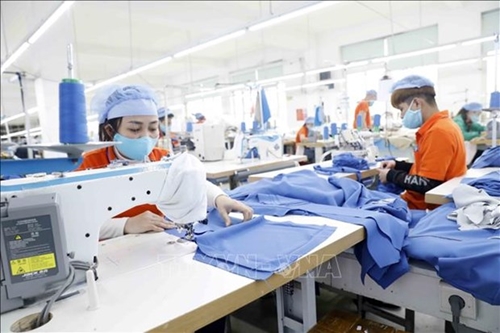RCEP, an integration priority of the ASEAN, forms a market with 2.2 billion consumers and a total GDP of about 26.2 trillion USD, accounting for about 30 percent of the global GDP, and becomes the largest free trade area in the world. It will eliminate tariffs on as much as 92 percent of goods traded among its signatories eventually, expand market access for investment, harmonize rules and regulations, and strengthen the supply chains within itself.
    |
 |
|
The deal is hoped to bring about opportunities for Vietnamese firms. (Photo for illustration) |
The pact was signed between 10 members of the ASEAN and five partners of China, Japan, the Republic of Korea, Australia, and New Zealand on November 15, 2020 during the 37th ASEAN Summit chaired by Vietnam. It encompasses four free trade agreements that the ASEAN has signed with the partners previously, creating a new free trade zone.
Luong Hoang Thai, head of the Multilateral Trade Policy Department of the Ministry of Industry and Trade, said that ASEAN member countries, including Vietnam, pin high hope on the deal as one of the factors for speeding up post-pandemic economic recovery.
However, experts held that along with opportunities, RCEP also brings about challenges, including fiercer competition for Vietnamese products and services due to the similar structure of products in other countries and Vietnam’s certain independence on imported materials for production.
But they asserted that the country’s international integration affirms that Vietnam boasts a rising capacity to join newly-established value chains in the region with its strong reform of administrative procedures and efforts to improve the investment environment.
They explained that the implementation of the RCEP will not bring about a shock in tariff cut for Vietnam as the country has long experience in processing tariff liberalization with ASEAN countries in 20 years and with the five partners in 15 years.
Furthermore, the deal is hoped to bring about opportunities for Vietnamese firms, especially small- and medium-sized enterprises to take part in new supply chains possibly created by the RCEP.
Chu Thang Trung, Deputy Director of the Ministry of Industry and Trade's Trade Remedies Authority, said that it is necessary for businesses to clearly understand legal regulations to avoid risks in partnering with foreign peers, adding his office will work with relevant agencies to strengthen communications among the business community on trade remedies.
A representative from the Import-Export Department under the Ministry of Industry and Trade clarified that the RCEP will give more chances for Vietnamese products, helping domestic firms to engage more deeply into the regional supply chains.
Thai said that along with their own efforts to become ready for the implementation of the deal, businesses will always receive support from State agencies in optimizing advantages from the deal.
Source: VNA